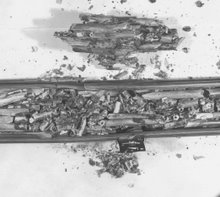Our great feds throw around a lot of dough including the following:
http://www.nwtrb.gov/reports/eds_rpt.pdf
Evaluation of the Technical Basis for Extended Dry Storage and Transportation of Used Nuclear Fuel
The report claims to be comprehensive, however, there is no consideration of the impact of crud.
On page 125 you will find the following table:
Table 9. Top Research Needs for Long‐term Used‐Fuel Storage
1.
Understanding long-term changes in the mechanical cladding behavior and fuel cladding degradation mechanisms potentially active during extended dry storage, including those that will act on the materials introduced in the last few years for fabrication of high-burnup fuels
2.
Understanding and modeling the time-dependent conditions that affect aging and degradation processes such as temperature profiles, in situ material stresses, quantity of residual water, and quantity of helium gas
3.
Modeling of age-related degradation of metal canisters, casks, and internal componentss during extended dry storage
4.
Inspection and monitoring of fuel and dry storage systems to verify the actual conditions and degradation behavior over time, including techniques for assuring the presence of helium cover gas
5.
Verification of the predicted mechanical performance of fuel after extended dry storage during cask and container handling, normal transportation operations, fuel removal from casks and containers, off-normal occurrences and accident events
6.
Design and demonstration of dry-transfer fuel systems for removal of fuel from casks and canisters following extended dry storage
The final paragraph of the report is on page 126:
At this point, the nuclear waste management policy of the United States is unclear, with the result that used fuel will be stored at reactor sites for longer than originally foreseen. It is thus essential that the appropriate research and development programs, and monitoring and inspection programs, are implemented as a matter of priority in order to demonstrate that used fuel can be safely stored for extended periods and then transported and handled as part of a future waste management program.
Again, the report claims to be comprehensive, however, there is no consideration of the impact of crud.
Wednesday, January 15, 2014
Subscribe to:
Comments (Atom)
